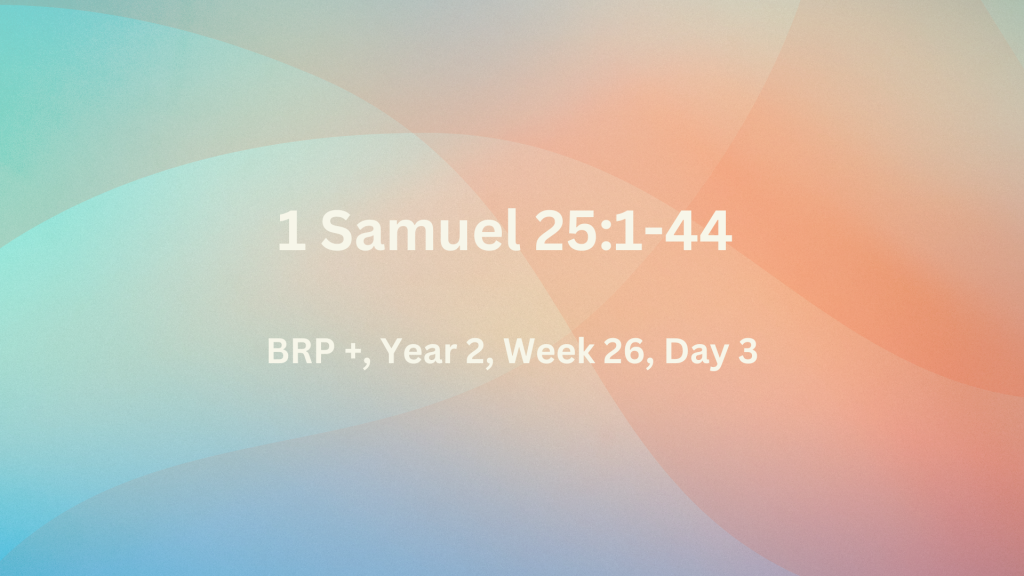1 Samuel 25:1-44
Q.1. What impact had Samuel made? What were we told about Nabal? What made David think his request from Nabal would be granted? What impact did his response have on David? – (1 Sam.25:1-13)
Samuel had a fitting conclusion to his life. He had been faithful to the Lord, and Israel respected him (1 Sam.12:3-5). He was just a boy when God had called him, and the Lord had begun to speak to His people through him again. – 15 Now Samuel judged Israel all the days of his life (1 Sam.7:15). He shone like a ray of light in the dark days of his age. He had been a great judge and prophet of the Lord, and his death was lamented (1 Sam.25:1). David had been anointed to be the next king, and this was acknowledged by Saul (1 Sam.24:20 c.f. 1 Sam.16:12-13). Nevertheless, David was not able to enjoy his kingship, for he was not safe from Saul’s schemes to kill him. As a consequence, David and his companions kept moving between the wilderness of Paran down south, and Carmel near the north-west coast in the hills of Manasseh (1 Sam.24:22-25:1-2 c.f. 1 Sam.25:7). Nabal was very rich with three thousand sheep and one thousand goats, and he was described as – … harsh and evil in his dealings … whereas his wife, Abigail was – … intelligent and beautiful … (1 Sam.25:3). As was David, Nabal was a Calebite, from the tribe of Judah (1 Sam.25:3 c.f. Num.13:6). Nabal was shearing. David, as a shepherd would know that shearing was followed by a time of feasting. David fully expected that Nabal would happily share his bounty with him, since his men had protected Nabal’s flocks from raiders and predators (1 Sam.25:7-8, 15-16). However, Nabal told David’s men – “Who is David? And who is the son of Jesse? There are many servants today who each are breaking away from his master. 11 Shall I then take my bread and my water and my meat that I have slaughtered for my shearers, and give it to men whose origin I do not know?” (1 Sam.25:10-11). He did not share the view of his wife (1 Sam.25:30-31). When David’s men reported Nabal’s snub to him, he was furious. He called his men to arms, to punish Nabal and his household (1 Sam.25:12-13).
Q.2. What did Nabal’s servant tell his wife? How did she respond? How did she save David’s reputation? What did she believe about him? How did David understand her appeal? – (1 Sam.25:14-35)
Nabal’s insulting response to David’s men was witnessed by his servants. One of them was troubled enough to tell Abigail about Nabal’s treatment of the very men who had protected them and their flocks (1 Sam.25:14-16). Convinced there would be ugly consequences, the servant urged Abigail to act to save them (1 Sam.25:17). Abigail showed great wisdom and courage: (i) She gathered a generous offering of food and sent some servants ahead to stall David (1 Sam.25:18-19, 27). (ii) She humbled herself before David and his men who had planned to decimate Nabal and his household (1 Sam.25:20-23). (iii) She apologised for the shoddy treatment of David’s men – Please forgive the transgression of your maidservant; for the Lord will certainly make for my lord an enduring house, because my lord is fighting the battles of the Lord, and evil will not be found in you all your days (1 Sam.25:28 c.f. c.f. 1 Sam.25:24-25). (iv) She begged him not to avenge himself and shed blood – this will not cause grief or a troubled heart to my lord, both by having shed blood without cause and by my lord having avenged himself. When the Lord deals well with my lord, then remember your maidservant (1 Sam.25:31 c.f. 1 Sam.25:26). (v) She expressed concern for David’s reputation, and her belief in his future elevation as Israel’s ruler – (1 Sam.25:28-31). Her godly appeal touched David’s heart, and he responded – 32 … Blessed be the Lord God of Israel, who sent you this day to meet me, 33 and blessed be your discernment, and blessed be you, who have kept me this day from bloodshed and from avenging myself by my own hand … 35 So David received from her hand what she had brought him and said to her, “Go up to your house in peace. See, I have listened to you and granted your request.” (1 Sam.25:32-33, 35). God would intervene dramatically.
Q.3. When did Abigail tell Nabal what she had done? How did he respond? Why did David propose to Abigail? Did it take long for her to decide? What happened to Michal? – (1 Sam.25:36-44)
The name Nabal means fool. He was a drunken fool (1 Sam.25:36). He could not be approached by either his servants or his own wife (1 Sam.25:17, 19). Consequently, she did not tell him about David’s plot until he had sobered up. The frightening news brought on a heart attack, and – about ten days later, the Lord struck Nabal and he died (1 Sam.25:38). When he heard the news, David responded, – “Blessed be the Lord, who has pleaded the cause of my reproach from the hand of Nabal and has kept back His servant from evil. The Lord has also returned the evildoing of Nabal on his own head.” Then David sent a proposal to Abigail, to take her as his wife (1 Sam.25:39). Abigail believed in David, and she – … quickly arose, and rode on a donkey, with her five maidens who attended her; and she followed the messengers of David and became his wife (1 Sam.25:42). She joined his other wife, Ahinoam of Jezreel. Michal, David’s first wife had been given to another man (1 Sam.25:43-44).

